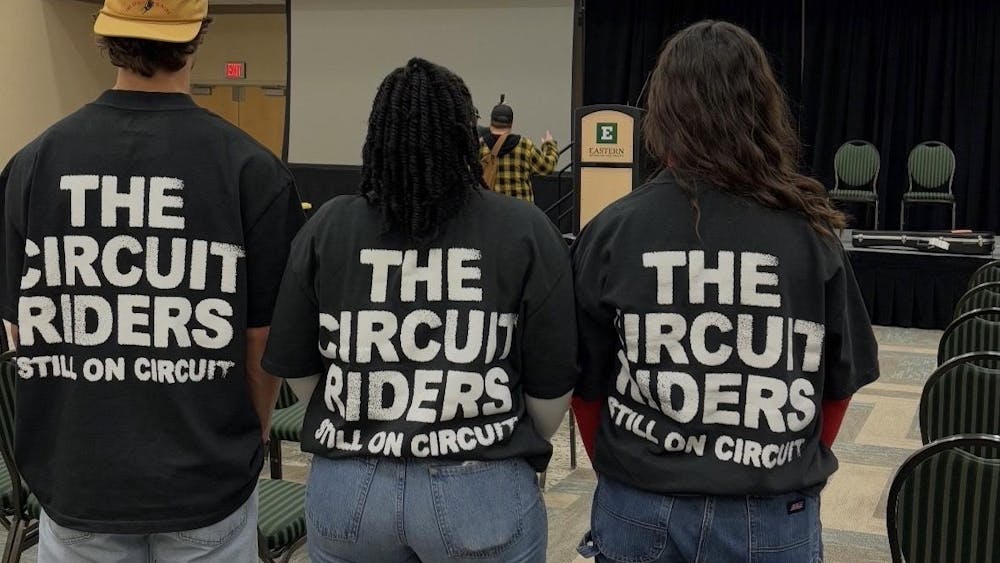Dave Strenski, founder of SolarYpsi, discussed the importance and benefits of solar energy for Eastern Michigan University’s campus and the Ypsilanti community on Thursday in room 301 of the Student Center.
“If I just bought power from the power company at, let’s say, 18 cents for five years, it would cost me $4,700. If I did it for 10 years, it would cost me $9,000,” Strenski said. “That means I will have paid off my panels in less than 10 years because instead of paying DTE, I bought these panels.”
Hosted by GREEN and the Energy and Sustainability Committee, the members were looking to increase awareness about the solar industry, according to environmental science major and Service Coordinator Tai Hornsby. Strenski said that the federal government returns 30 percent of taxes for the installation because they are trying to subsidize renewable energy.
“It doesn’t have to be solar power, they’re also subsidizing fossil fuels … oil companies because it’s something we need,” Strenski said. “It’s an incentive. The way I look at it is this is still a new technology so you need to incentivize it … they’re subsidizing energy efficiency because it’s good for the country.”
He said that out of the whole cost of installation, the panels account for the majority of the cost. He said that this is dropping immensely and said China is dumping a lot of money in manufacturing, which drops the prices.
From an economic perspective, he said, “You’re going to make energy payments so what you’ll probably do is you’re going to want to reach out to the future grab five, six, or seven years’ worth of money … you want to pull that forward, put solar panels on your house and then you’re good for power for the next 30 years.”
Strenski said the reason people are not acting out over the idea and price is because financial workers or others typically look for a three-year payback. People also claim they do not plan on living in a house for 10 years or are attending college for four years and do not want something that pays off in six years.
“You’ll still get your money back,” he said. “If you put solar panels on your house, your house is going to be easier to sell because it comes with free power and you’ll recoup that money so maybe you’ll get another extra 10 grand when you sell your house.”
Strenski also said that the panels are made of the same silicon used in computer chips and in 2007, more silicon went toward panels, which have a glass coating. He said certain weather patterns unfortunately have a small effect on it, though he said there is typically zero maintenance.
“Erosion is erosion, whether it happens on a solar panel or a rock so you will get grit and dirt that will settle on here and you will scratch this surface over time so you will lose a couple percent over the life of it,” Strenski said.
Tom Kovacs, associate professor in the Department of Geography and Geology and program coordinator for the interdisciplinary environmental science and society program, wrote a proposal earlier this month to the office of research and development for a grant to place solar panels on the Mark Jefferson building. He said it’s for the purposes of educating the EMU, Ypsilanti and Washtenaw County communities about solar power and how much energy it produces.
“Mark Jefferson is LEED Gold certified,” Kovacs said. “LEED is an organization that classifies the energy efficiency of buildings.”
Kovacs said that to get the gold certification, certain things need to be built into the building, which accommodates a specific number of credits. He also said with the installation there would be educational displays about solar power and all of the energy efficiencies built into the building that people don’t know about.
“It’s just a way of showing the public how energy efficient the building is by giving the one classification,” Kovacs said. “But there’s things in there that make it energy efficient so part of the education displays would be to educate the public in what goes into a building that makes it energy efficient.”
Hornsby said he is hoping to see solar panels on campus especially because EMU has an environmental science program, though there aren’t any panels or renewable energy.
“Eastern has more buying power than most areas in [Ypsilanti],” Hornsby said. “If they bought solar panels, the energy absorbed could be fed back into the community. Also natural gas produces methane, which is a greenhouse gas that’s stronger than carbon, ultimately retaining the Earth’s heat more.”
For more information, visit SolarYpsi’s website.









